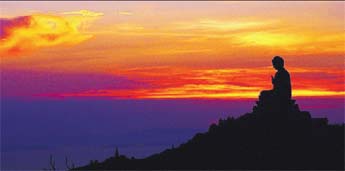The British Library has discovered sensational manuscript fragments the potential significance of which for Buddhist scholars is comparable to that of the Dead Sea Scrolls for Christianity and Judaism.
The manuscripts, birchbark scrolls that looked like "badly rolled-up cigars" when first shown to the Library, are believed to be the earliest surviving Buddhist texts. "These will allow scholars to get nearer to what Buddha said than ever before," said Graham Shaw, deputy director of the Library's Oriental and India Office Collections. They date from the end of the 1st century AD or the beginning of the 2nd century AD. Buddha, who inspired disciples to spread his teachings, died in 486 BC. "With these", said Mr. Shaw, "we're within 500 to 600 years of his death." Apart from bringing scholars closer to the original language of Buddha, this could corroborate the authenticity of teachings and sermons recounted in later texts.
The manuscripts include 60 fragments, ranging from Buddha's sermons to poems and treatises on the psychology of perception. Seen in a new light, their value is "incalculable", Mr. Shaw said. "How would you put a value on the Dead Sea Scrolls?" Years of study lie ahead before the text can be deciphered, analysed and compared with existing texts. The fragments include tales told on the banks of Lake Anavatapta at an assembly of the Buddha and his disciples.
Buddhists believe in reincarnation and each explains his deeds in a former life and how they influenced this one.
Just getting a peek at the text proved difficult. Those involved had to uncurl the "cigars" whose fragility was a conservator's nightmare. Mr, Shaw said: "It is fiendishly brittle material. The first question was, 'will these ever unroll or will they simply crumble into many pieces?' "There have been reports in old excavations of things like this having been found and the moment they were touched literally crumbled to dust." "We put them in a bell jar overnight and allowed them to be slowly moistened. Then one of our conservators used tweezers and began unrolling, and another applied more moisture, without saturating it." Mr. Shaw stated that the exact origin of the scrolls is unknown beyond the fact that they were probably found in Afghanistan in earthenware jars. These, too, may be original pieces, but tests have yet to be conducted on them.
Subscribe to:
Post Comments (Atom)



No comments:
Post a Comment